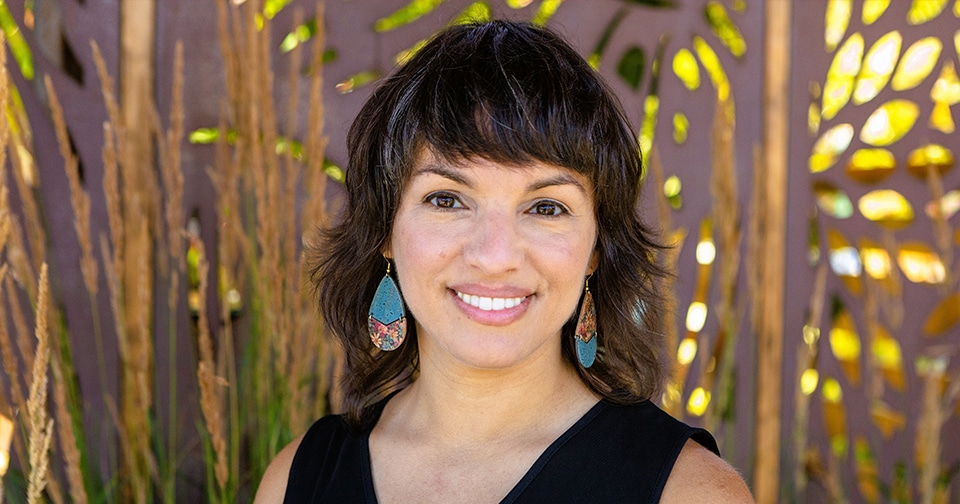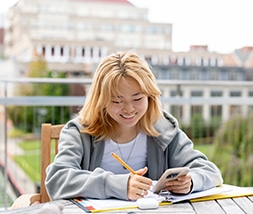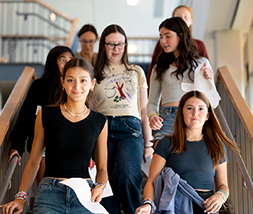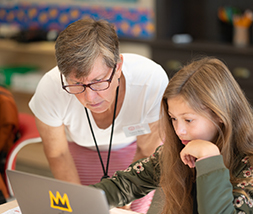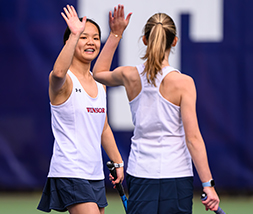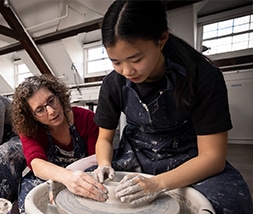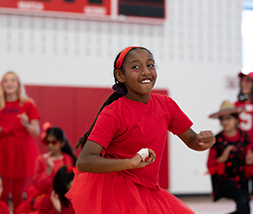Bridging Divides: Fearless Conversations with Mónica Guzmán
A week before the presidential election, the full Winsor community gathered over Zoom to speak with author and journalist Mónica Guzmán about her book I Never Thought of It That Way: How to Have Fearlessly Curious Conversations in Dangerously Divided Times. The book was offered to faculty and staff as a summer read encouraging a more open dialogue and offering tangible advice on how to come together and listen to those with whom you disagree.
The virtual event on October 28, Bridging Divides: Fearless Conversations with Mónica Guzmán, was attended by over 100 Winsor families and was moderated by Julian Braxton, Winsor’s director of community and inclusion and holder of the Bezan Chair for Community and Inclusion. The panel covered topics such as the internet and the falsehoods that flourish there, and non-judgemental listening.
According to her bio, Guzmán is a Mexican immigrant, Latina, and dual citizen of the U.S. and Mexico. She lives in Seattle with her husband and two kids, and is the “proud liberal daughter of conservative parents.” Guzmán talked about the differences in perspectives and political persuasions in her own family, lending personal credibility to an issue that many others currently face in their own families and communities.
“Back when Trump won in 2016, I was devastated. My mother did an extraordinary thing. I called her and she listened. She listened to my pain. She listened to the things I was so devastated about from that election,” said Guzmán describing how her mom put aside her political beliefs and even her glee from Trump’s win to just be mother to her daughter.
Panel participants included Winsor alum and parent Fatima Aziz ’06, P’32, Winsor student Bibi Noury-Ello ’25, and Winsor alum and Science Faculty Eve Elizondo ’17.
The internet and the figurative masks people wear on various social media platforms was a dominant part of the discussion. “Some of us billboard ourselves with a cause that we love and we might even say unfollow if you disagree… [The internet] is not a great space for candor and complexity and yet some of the toughest topics come up in that space so we are giving ourselves an extremely difficult job with a very light toolbox. It’s just words with some emojis,” said Guzmán.
Fatima recognized that individuals receive differing information based on their search histories and noted that can be useful in stemming the emotional response we might feel when we see statements online from others with whom we disagree. She explained, “[By seeing the post first,] you can filter out your extreme emotions in private, and then maybe when you’re face to face, you can come from a safer place of understanding and humanity versus just trying to convince someone that what they’re seeing is wrong.”
Bibi touched on how even at Winsor, a place that works hard to foster open dialogue and discussion, that she was surprised to learn how much of a divide there was over the current conflict in Israel and Gaza amongst her fellow students. “We’ve gotten to the point where we are so afraid to have these conversations where we might disagree that we don’t even know what we disagree on anymore,” she said.
While the discussion was an example in sharing opinions openly and with candor, Guzmán also provided highly specific ways to navigate through difficult and divided discussions.
“Emotion is content so there’s good examples of when we can use language to name what’s going on, the feeling, and then restate the intention. So if I am getting really upset, and hopefully I have built some trust with this person, I can say something like ‘I just want to pause and let you know that I am feeling some kind of way about this. I can tell what we’re discussing here is upsetting me but I want to keep listening and I know that there is an edge here that I want to push,’” said Guzmán, reinforcing the idea of not walking away or abruptly ending a difficult conversation, but pushing through it with respect for the other person to better understand.
The panel’s themes of fostering understanding across differences offered an opportunity to explore how open, fearless conversations can bridge divides in our increasingly polarized world, which was confirmed by the panel’s alums and students.
“I always loved taking on a debate where I disagreed with the thing I was arguing for,” said Eve. “I always took pride in my ability to be flexible in my thinking and my ‘I never thought of it that way moment’ was that I couldn’t quite understand what made this skill come naturally to me. Why was this something that I had built up over the years and why in the world would someone be so stubborn as to lock their beliefs in place? That actually scares me.”
Eve said she realized this ability came from being in places where she felt safe in sharing her beliefs whether they aligned with the people she was with or not. “I realized that if I want to have productive conversations with people I disagree with, it has to start with making an effort to see them first as they are so they can feel safe… It seems like allowing that curiosity to come forth has to start somewhere and that somewhere has to be safe.”
At the close of the discussion, Braxton asked Guzmán what advice she had for the school community as the country headed to a conclusion in what was a highly divisive election cycle. Guzmán explained, “First start by asking yourself: how do you want to show up, and how do you want to treat people if your side wins or loses? If you want to ask someone why they believe what they believe, try asking them how they have come to believe what they believe,” Guzmán said. “Incremental steps make all the difference.”
